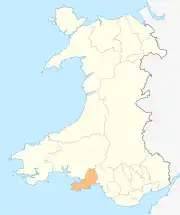| Gower | |
|---|---|
| County constituency for the House of Commons | |
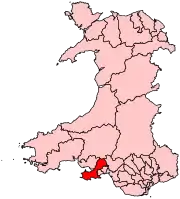 Boundary of Gower in Wales | |
| Preserved county | West Glamorgan |
| Electorate | 62,389 (December 2010)[1] |
| Major settlements | Mumbles, Clydach, Gorseinon, Pontarddulais, Penllergaer |
| Current constituency | |
| Created | 1885 |
| Member of Parliament | Tonia Antoniazzi (Labour) |
| Seats | One |
| Created from | Glamorganshire |
| Overlaps | |
| Senedd | Gower, South Wales West |
Gower (Welsh: Gŵyr) is a constituency[n 1] created in 1885 and represented in the House of Commons of the UK Parliament by one Member of Parliament (MP).[n 2] Tonia Antoniazzi of the Labour Party became its MP after winning it from Conservative Byron Davies in the 2017 UK general election. Her party had previously represented the seat from 1909 until 2015.
The constituency is to retain its name but its boundaries altered, as part of the 2023 Periodic Review of Westminster constituencies and under the June 2023 final recommendations of the Boundary Commission for Wales for the next United Kingdom general election.[2]
Overview
The constituency was created in 1885 and has had relatively widely varied boundaries. Before 2015 it had elected Labour MPs since 1906, sharing the longest single-party representation with Normanton and Makerfield. It holds approximately a third of the electorate of the city and county of Swansea, the rest of which is Swansea West and Swansea East.
Boundaries
1885–1918: The Municipal Borough of Swansea, and the Sessional Divisions of Gower, Pontardawe, and Swansea.
1918–1950: The Urban District of Oystermouth, and the Rural Districts of Gower and Swansea.
1950–1983: The Urban District of Llwchwr, and the Rural Districts of Gower and Pontardawe.
1983–2010: The City of Swansea wards of Bishopston, Fairwood, Gower, Newton, Oystermouth, Penclawdd, Pennard, and West Cross, and the Borough of Lliw Valley wards of Clydach, Dulais East, Gorseinon Central, Gorseinon East, Gowerton East, Gowerton West, Graigfelin, Kingsbridge, Llangyfelach, Lower Loughor, Mawr, Penllergaer, Penyrheol, Pontardulais, Tal-y-bont, Upper Loughor, and Vardre.
2010–present: The Swansea County electoral divisions of Bishopston, Clydach, Fairwood, Gorseinon, Gower, Gowerton, Kingsbridge, Llangyfelach, Lower Loughor, Mawr, Newton, Oystermouth, Penclawdd, Penllergaer, Pennard, Penyrheol, Pontardulais, Upper Loughor, and West Cross.
The constituency encompasses most of the old Lordship of Gower (less the city of Swansea) and covers the inner Gower Peninsula and outer Gower areas including Clydach, Gowerton, Gorseinon, Felindre and Garnswllt.
History
Liberals and Labour 1885–1918
The first years, seeing more heavy industrial make-up than today, represented a struggle between the Liberals and those who favoured direct labour representation. Although its new electors in 1885 were predominantly the miners and tinplaters of the Swansea Valley, the new MP was Frank Ash Yeo, a local colliery owner and clearly an upper-class figure.[3] In 1885 he comfortably defeated Henry Nathaniel Miers of Ynyspenllwch in the Swansea Valley, a coal owner, tinplate manufacturer and landowner.[4]: 60–61
On Yeo's death in 1888, representatives of the trade unions in the constituency overturned the Liberal association's choice of Sir Horace Davey and ensured the selection of David Randell as candidate. Randell was a Methodist solicitor who specialised in trade union litigation and his victory, albeit with a reduced majority over John Dillwyn Llewellyn, formed the basis of later claims that Gower was a 'labour' seat.[3]
Modern history
Since 1945, Gower has been a mostly reliable seat for the Labour Party, returning Labour's candidate except in two elections; in the 1983 Conservative landslide, in which it was won by just 1,205 votes, and in 2010, where it was held by 2,683 votes. However, unlike many Welsh valley seats, which have given commanding majorities to Labour, Gower has not seen a majority of over 10,000 votes or 20% of the vote for the Labour candidate in any election (with the exception of 1997) since 1979. In 2015, incumbent MP Martin Caton stood down, and the new Labour candidate Liz Evans was defeated by the Conservative Byron Davies by 27 votes, less than 0.1% of votes cast, which made it the most marginal Conservative seat going into the next election.[5] Davies' victory brought 105 consecutive years of Labour representation to an end, but Labour won the seat back in the 2017 general election with a majority of 3,269, slightly larger than Caton's final majority in 2010.
Members of Parliament
Elections
Elections in the 19th century
Elections in the 1880s

| Party | Candidate | Votes | % | ±% | |
|---|---|---|---|---|---|
| Liberal | Frank Ash Yeo | 5,560 | 72.6 | N/A | |
| Conservative | Henry Nathaniel Miers | 2,103 | 27.4 | N/A | |
| Majority | 3,457 | 45.2 | N/A | ||
| Turnout | 7,663 | 72.6 | N/A | ||
| Registered electors | 10,562 | ||||
| Liberal win (new seat) | |||||
| Party | Candidate | Votes | % | ±% | |
|---|---|---|---|---|---|
| Liberal | Frank Ash Yeo | Unopposed | |||
| Registered electors | |||||
| Liberal hold | |||||
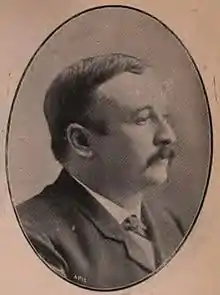
| Party | Candidate | Votes | % | ±% | |
|---|---|---|---|---|---|
| Liberal | David Randell | 3,964 | 54.1 | N/A | |
| Conservative | John Dillwyn-Llewelyn | 3,358 | 45.9 | N/A | |
| Majority | 606 | 8.2 | N/A | ||
| Turnout | 7,322 | 67.2 | N/A | ||
| Registered electors | 10,896 | ||||
| Liberal hold | Swing | N/A | |||
Elections in the 1890s
| Party | Candidate | Votes | % | ±% | |
|---|---|---|---|---|---|
| Liberal | David Randell | Unopposed | |||
| Registered electors | |||||
| Liberal hold | |||||
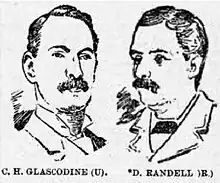
| Party | Candidate | Votes | % | ±% | |
|---|---|---|---|---|---|
| Liberal | David Randell | 6,074 | 72.9 | N/A | |
| Conservative | Charles Henry Glascodyne | 2,256 | 27.1 | N/A | |
| Majority | 3,818 | 45.8 | N/A | ||
| Turnout | 8,330 | 68.6 | N/A | ||
| Registered electors | 12,150 | ||||
| Liberal hold | Swing | N/A | |||
Elections in the 20th century
Elections in the 1900s

| Party | Candidate | Votes | % | ±% | |
|---|---|---|---|---|---|
| Liberal | John Thomas | 4,276 | 52.6 | ―20.3 | |
| Labour Repr. Cmte. | John Hodge | 3,853 | 47.4 | N/A | |
| Majority | 423 | 5.2 | ―40.6 | ||
| Turnout | 8,129 | 66.3 | ―2.3 | ||
| Registered electors | 12,267 | ||||
| Liberal hold | Swing | ||||
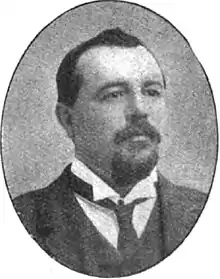
]
| Party | Candidate | Votes | % | ±% | |
|---|---|---|---|---|---|
| Lib-Lab | John Williams | 4,841 | 42.8 | N/A | |
| Liberal | Jeremiah Williams | 4,522 | 40.0 | ―12.6 | |
| Conservative | Ernest Helme | 1,939 | 17.2 | N/A | |
| Majority | 319 | 2.8 | N/A | ||
| Turnout | 11,302 | 83.0 | +16.7 | ||
| Registered electors | 13,624 | ||||
| Lib-Lab gain from Liberal | Swing | ||||
Elections in the 1910s
| Party | Candidate | Votes | % | ±% | |
|---|---|---|---|---|---|
| Labour | John Williams | 9,312 | 78.6 | +35.8 | |
| Conservative | Percy Reginald Owen Abel Simner | 2,532 | 21.4 | +4.2 | |
| Majority | 6,780 | 57.2 | N/A | ||
| Turnout | 11,844 | 80.5 | ―2.5 | ||
| Registered electors | 14,712 | ||||
| Labour gain from Lib-Lab | Swing | +15.8 | |||
| Party | Candidate | Votes | % | ±% | |
|---|---|---|---|---|---|
| Labour | John Williams | 5,480 | 54.8 | ―23.8 | |
| Liberal | W F Phillips | 4,527 | 45.2 | N/A | |
| Majority | 953 | 9.6 | ―47.6 | ||
| Turnout | 10,007 | 68.0 | ―12.5 | ||
| Registered electors | 14,712 | ||||
| Labour hold | Swing | ||||
General Election 1914–15: A General Election was required to take place before the end of 1915. The political parties had been making preparations for an election to take place, and by July 1914, the following candidates had been selected:
- Labour: John Williams
- Liberal:
- Unionist: Peter D Thomas[12]
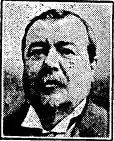
| Party | Candidate | Votes | % | ±% | |
|---|---|---|---|---|---|
| Labour | John Williams | 10,109 | 54.8 | ±0.0 | |
| Liberal | D H Williams | 8,353 | 45.2 | ±0.0 | |
| Majority | 1,756 | 9.6 | ±0.0 | ||
| Turnout | 18,462 | 62.2 | ―5.8 | ||
| Registered electors | 29,667 | ||||
| Labour hold | Swing | ±0.0 | |||
Elections in the 1920s
| Party | Candidate | Votes | % | ±% | |
|---|---|---|---|---|---|
| Labour | David Grenfell | 13,296 | 57.5 | +2.7 | |
| National Liberal | D H Williams | 9,841 | 42.5 | ―2.7 | |
| Majority | 3,455 | 15.0 | +5.4 | ||
| Turnout | 23,137 | 73.0 | +10.8 | ||
| Registered electors | 31,679 | ||||
| Labour hold | Swing | +2.7 | |||
| Party | Candidate | Votes | % | ±% | |
|---|---|---|---|---|---|
| Labour | David Grenfell | 13,388 | 54.2 | ―0.6 | |
| Liberal | Frederick William Davies | 11,302 | 45.8 | +0.6 | |
| Majority | 2,086 | 8.4 | ―1.2 | ||
| Turnout | 24,690 | 74.6 | +12.4 | ||
| Registered electors | 33,084 | ||||
| Labour hold | Swing | ―0.6 | |||
| Party | Candidate | Votes | % | ±% | |
|---|---|---|---|---|---|
| Labour | David Grenfell | 14,771 | 59.1 | +4.9 | |
| Liberal | Leah Norah Folland | 10,219 | 40.9 | ―4.9 | |
| Majority | 4,552 | 18.2 | +9.8 | ||
| Turnout | 24,990 | 73.0 | ―1.6 | ||
| Registered electors | 34,250 | ||||
| Labour hold | Swing | +4.9 | |||
| Party | Candidate | Votes | % | ±% | |
|---|---|---|---|---|---|
| Labour | David Grenfell | 15,374 | 57.2 | ―1.9 | |
| Unionist | Ernest Thomas Nethercoat | 11,516 | 42.8 | N/A | |
| Majority | 3,858 | 14.4 | ―3.8 | ||
| Turnout | 26,890 | 75.5 | +2.5 | ||
| Registered electors | 35,631 | ||||
| Labour hold | Swing | N/A | |||
| Party | Candidate | Votes | % | ±% | |
|---|---|---|---|---|---|
| Labour | David Grenfell | 20,664 | 54.0 | ―3.2 | |
| Liberal | Frederick William Davies | 11,055 | 28.9 | N/A | |
| Unionist | Alan Lennox-Boyd | 6,554 | 17.1 | ―25.7 | |
| Majority | 9,609 | 25.1 | +10.7 | ||
| Turnout | 38,273 | 79.6 | +4.1 | ||
| Registered electors | 48,060 | ||||
| Labour hold | Swing | +11.3 | |||
Elections in the 1930s
| Party | Candidate | Votes | % | ±% | |
|---|---|---|---|---|---|
| Labour | David Grenfell | 21,963 | 53.4 | ―0.6 | |
| Liberal | Edgar Jones | 19,157 | 46.6 | +17.7 | |
| Majority | 2,806 | 6.8 | ―18.3 | ||
| Turnout | 41,120 | 83.5 | +3.9 | ||
| Registered electors | 49,232 | ||||
| Labour hold | Swing | ||||
| Party | Candidate | Votes | % | ±% | |
|---|---|---|---|---|---|
| Labour | David Grenfell | 25,632 | 66.8 | +13.4 | |
| National | G C Hutchinson | 13,239 | 33.2 | N/A | |
| Majority | 13,393 | 33.6 | +26.8 | ||
| Turnout | 38,871 | 76.1 | ―7.4 | ||
| Registered electors | 52,376 | ||||
| Labour hold | Swing | ||||
Election in the 1940s
| Party | Candidate | Votes | % | ±% | |
|---|---|---|---|---|---|
| Labour | David Grenfell | 30,676 | 68.5 | +1.7 | |
| National Liberal | John Aeron-Thomas | 14,115 | 31.5 | N/A | |
| Majority | 16,561 | 37.0 | +3.4 | ||
| Turnout | 44,791 | 77.0 | +0.9 | ||
| Registered electors | 58,188 | ||||
| Labour hold | Swing | ||||
Elections in the 1950s
| Party | Candidate | Votes | % | ±% | |
|---|---|---|---|---|---|
| Labour | David Grenfell | 32,564 | 76.1 | +7.6 | |
| National Liberal | Rowe Harding | 10,208 | 23.9 | ―7.6 | |
| Majority | 22,356 | 52.2 | +15.2 | ||
| Turnout | 42,772 | 84.8 | +7.8 | ||
| Registered electors | 50,459 | ||||
| Labour hold | Swing | ||||
| Party | Candidate | Votes | % | ±% | |
|---|---|---|---|---|---|
| Labour | David Grenfell | 32,661 | 75.9 | ―0.2 | |
| National Liberal | Rowe Harding | 10,351 | 24.1 | +0.2 | |
| Majority | 22,310 | 51.8 | ―0.4 | ||
| Turnout | 43,012 | 84.3 | ―0.5 | ||
| Registered electors | 51,016 | ||||
| Labour hold | Swing | ||||
| Party | Candidate | Votes | % | ±% | |
|---|---|---|---|---|---|
| Labour | David Grenfell | 26,304 | 68.3 | ―7.6 | |
| National Liberal | B Gwyther Jones | 8,135 | 21.1 | ―3.0 | |
| Plaid Cymru | Chris Rees | 4,101 | 10.6 | N/A | |
| Majority | 18,169 | 47.2 | ―4.6 | ||
| Turnout | 38,540 | 76.8 | ―7.5 | ||
| Registered electors | 50,193 | ||||
| Labour hold | Swing | ||||
| Party | Candidate | Votes | % | ±% | |
|---|---|---|---|---|---|
| Labour | Ifor Davies | 27,441 | 66.9 | ―1.4 | |
| National Liberal | Michael Heseltine | 9,837 | 24.0 | +2.9 | |
| Plaid Cymru | John Gwyn Griffiths | 3,744 | 9.1 | ―1.5 | |
| Majority | 17,604 | 42.9 | ―4.3 | ||
| Turnout | 41,022 | 82.9 | +6.1 | ||
| Registered electors | 49,480 | ||||
| Labour hold | Swing | ||||
Elections in the 1960s
| Party | Candidate | Votes | % | ±% | |
|---|---|---|---|---|---|
| Labour | Ifor Davies | 27,895 | 71.0 | +4.1 | |
| National Liberal | J Huw P. Griffiths | 8,822 | 22.5 | ―1.5 | |
| Plaid Cymru | John Gwyn Griffiths | 2,562 | 6.5 | ―2.6 | |
| Majority | 19,073 | 48.5 | +5.6 | ||
| Turnout | 39,279 | 80.0 | ―2.9 | ||
| Registered electors | 49,119 | ||||
| Labour hold | Swing | ||||
| Party | Candidate | Votes | % | ±% | |
|---|---|---|---|---|---|
| Labour | Ifor Davies | 29,910 | 77.2 | +6.2 | |
| Conservative | David R. O. Lewis | 8,852 | 22.8 | +0.3 | |
| Majority | 21,058 | 54.4 | +5.9 | ||
| Turnout | 38,762 | 77.9 | ―2.1 | ||
| Registered electors | 49,731 | ||||
| Labour hold | Swing | ||||
Elections in the 1970s
| Party | Candidate | Votes | % | ±% | |
|---|---|---|---|---|---|
| Labour | Ifor Davies | 26,485 | 63.4 | ―13.8 | |
| Conservative | Michael J. Carter | 9,435 | 22.6 | ―0.2 | |
| Plaid Cymru | Clifford G. Davies | 5,869 | 14.0 | N/A | |
| Majority | 17,050 | 40.8 | ―13.6 | ||
| Turnout | 41,789 | 76.9 | ―1.0 | ||
| Registered electors | 54,317 | ||||
| Labour hold | Swing | ||||
| Party | Candidate | Votes | % | ±% | |
|---|---|---|---|---|---|
| Labour | Ifor Davies | 23,856 | 52.9 | ―10.5 | |
| Conservative | D F R George | 8,780 | 19.4 | ―3.2 | |
| Liberal | Clem Thomas | 8,737 | 19.4 | N/A | |
| Plaid Cymru | J N Harris | 3,741 | 8.3 | ―5.7 | |
| Majority | 15,076 | 33.5 | ―7.3 | ||
| Turnout | 45,114 | 79.9 | +3.0 | ||
| Registered electors | 56,476 | ||||
| Labour hold | Swing | ||||
| Party | Candidate | Votes | % | ±% | |
|---|---|---|---|---|---|
| Labour | Ifor Davies | 25,067 | 57.3 | +4.4 | |
| Conservative | D F R George | 8,863 | 20.3 | +0.9 | |
| Liberal | R Owen | 5,453 | 12.4 | ―7.0 | |
| Plaid Cymru | M Powell | 4,369 | 10.0 | +1.7 | |
| Majority | 16,204 | 37.0 | +3.5 | ||
| Turnout | 43,752 | 76.9 | ―3.0 | ||
| Registered electors | 56,867 | ||||
| Labour hold | Swing | ||||
| Party | Candidate | Votes | % | ±% | |
|---|---|---|---|---|---|
| Labour | Ifor Davies | 24,963 | 53.2 | ―4.1 | |
| Conservative | T Llewellyn | 14,322 | 30.6 | +10.3 | |
| Liberal | R Blakeborough-Pownal | 4,245 | 9.0 | ―3.4 | |
| Plaid Cymru | E Thomas | 3,357 | 7.2 | ―2.8 | |
| Majority | 10,641 | 22.6 | ―14.4 | ||
| Turnout | 46,887 | 80.8 | +3.9 | ||
| Registered electors | 58,023 | ||||
| Labour hold | Swing | ||||
Elections in the 1980s
| Party | Candidate | Votes | % | ±% | |
|---|---|---|---|---|---|
| Labour | Gareth Wardell | 17,095 | 43.5 | ―9.7 | |
| SDP | Gwynoro Jones | 9,875 | 25.1 | +16.1 | |
| Conservative | Trefor Llewellyn | 8,690 | 22.1 | ―8.5 | |
| Plaid Cymru | Ieuan Owen | 3,431 | 8.7 | +1.5 | |
| Computer Democrat | John Donovan | 125 | 0.3 | N/A | |
| Civil Rights/Welsh Political Prisoner | David Burns | 103 | 0.3 | N/A | |
| Majority | 7,220 | 18.4 | ―4.2 | ||
| Turnout | 39,319 | 65.4 | ―15.4 | ||
| Registered electors | 60,123 | ||||
| Labour hold | Swing | +0.7 | |||
| Party | Candidate | Votes | % | ±% | |
|---|---|---|---|---|---|
| Labour | Gareth Wardell | 16,972 | 38.1 | ―15.1 | |
| Conservative | Tom Kenyon | 15,767 | 35.3 | +4.7 | |
| SDP | Gwynoro Jones | 10,416 | 23.4 | N/A | |
| Plaid Cymru | Nigel Williams | 1,444 | 3.2 | ―4.0 | |
| Majority | 1,205 | 2.8 | ―19.8 | ||
| Turnout | 44,599 | 78.7 | ―2.1 | ||
| Registered electors | 56,693 | ||||
| Labour hold | Swing | ||||
| Party | Candidate | Votes | % | ±% | |
|---|---|---|---|---|---|
| Labour | Gareth Wardell | 22,139 | 46.6 | +8.5 | |
| Conservative | Gerald Price | 16,374 | 34.5 | ―0.8 | |
| SDP | David Elliott | 7,645 | 16.1 | ―7.3 | |
| Plaid Cymru | Jonathan Edwards | 1,341 | 2.8 | ―0.4 | |
| Majority | 5,765 | 12.1 | +9.3 | ||
| Turnout | 47,498 | 80.7 | +2.0 | ||
| Registered electors | 58,871 | ||||
| Labour hold | Swing | ||||
Elections in the 1990s
| Party | Candidate | Votes | % | ±% | |
|---|---|---|---|---|---|
| Labour | Gareth Wardell | 23,485 | 50.1 | +3.5 | |
| Conservative | Anthony L. Donnelly | 16,437 | 35.1 | +0.6 | |
| Liberal Democrats | Christopher G. Davies | 4,655 | 9.9 | ―6.2 | |
| Plaid Cymru | Adam Price | 1,639 | 3.5 | +0.7 | |
| Green | Brian Kingzett | 448 | 1.0 | N/A | |
| Raving Loony Green Giant Party | Gerry P. Egan | 114 | 0.2 | N/A | |
| Natural Law | Michael S. Beresford | 74 | 0.2 | N/A | |
| Majority | 7,048 | 15.0 | +2.9 | ||
| Turnout | 46,852 | 81.9 | +1.2 | ||
| Registered electors | 57,231 | ||||
| Labour hold | Swing | +1.5 | |||
| Party | Candidate | Votes | % | ±% | |
|---|---|---|---|---|---|
| Labour | Martin Caton | 23,313 | 53.8 | +3.7 | |
| Conservative | Alun Cairns | 10,306 | 23.8 | ―11.3 | |
| Liberal Democrats | Howard W. Evans | 5,624 | 13.0 | +3.1 | |
| Plaid Cymru | D Elwyn Williams | 2,226 | 5.1 | +1.6 | |
| Referendum | Richard D. Lewis | 1,745 | 4.0 | N/A | |
| Independent | Anthony G. Popham | 122 | 0.3 | N/A | |
| Majority | 13,007 | 30.0 | +15.0 | ||
| Turnout | 43,336 | 75.1 | ―6.8 | ||
| Registered electors | 57,707 | ||||
| Labour hold | Swing | +7.5 | |||
Elections in the 21st century
Elections in the 2000s
| Party | Candidate | Votes | % | ±% | |
|---|---|---|---|---|---|
| Labour | Martin Caton | 17,676 | 47.3 | ―6.5 | |
| Conservative | John Bushell | 10,281 | 27.5 | +3.7 | |
| Liberal Democrats | Sheila Waye | 4,507 | 12.1 | ―0.9 | |
| Plaid Cymru | Siân Caiach | 3,865 | 10.3 | +5.2 | |
| Green | Tina Shrewsbury | 607 | 1.6 | N/A | |
| Socialist Labour | Darran Hickery | 417 | 1.1 | N/A | |
| Majority | 7,395 | 19.8 | ―10.2 | ||
| Turnout | 37,353 | 63.4 | ―11.7 | ||
| Registered electors | 58,935 | ||||
| Labour hold | Swing | ―5.1 | |||
| Party | Candidate | Votes | % | ±% | |
|---|---|---|---|---|---|
| Labour | Martin Caton | 16,786 | 42.5 | ―4.8 | |
| Conservative | Mike Murray | 10,083 | 25.5 | ―2.0 | |
| Liberal Democrats | Nick Tregoning | 7,291 | 18.4 | +6.3 | |
| Plaid Cymru | Sian Caiach | 3,089 | 7.8 | ―2.5 | |
| UKIP | Richard Lewis | 1,264 | 3.2 | N/A | |
| Green | Rhodri Griffiths | 1,029 | 2.6 | +1.0 | |
| Majority | 6,703 | 17.0 | ―2.8 | ||
| Turnout | 39,542 | 64.9 | +1.5 | ||
| Registered electors | 60,432 | ||||
| Labour hold | Swing | ―1.4 | |||
Elections in the 2010s
| Party | Candidate | Votes | % | ±% | |
|---|---|---|---|---|---|
| Labour | Martin Caton | 16,016 | 38.4 | ―4.0 | |
| Conservative | Byron Davies | 13,333 | 32.0 | +6.5 | |
| Liberal Democrats | Mike Day | 7,947 | 19.1 | +0.6 | |
| Plaid Cymru | Darren Price | 2,760 | 6.6 | ―1.2 | |
| BNP | Adrian Jones | 963 | 2.3 | N/A | |
| UKIP | Gordon Triggs | 652 | 1.6 | ―1.6 | |
| Majority | 2,683 | 6.4 | ―10.6 | ||
| Turnout | 41,671 | 67.5 | +2.1 | ||
| Registered electors | 61,696 | ||||
| Labour hold | Swing | ―5.3 | |||
| Party | Candidate | Votes | % | ±% | |
|---|---|---|---|---|---|
| Conservative | Byron Davies | 15,862 | 37.1 | +5.1 | |
| Labour | Liz Evans | 15,835 | 37.0 | ―1.4 | |
| UKIP | Colin Beckett | 4,773 | 11.2 | +9.6 | |
| Plaid Cymru | Darren Thomas | 3,051 | 7.1 | +0.5 | |
| Liberal Democrats | Mike Sheehan | 1,552 | 3.6 | ―15.5 | |
| Green | Julia Marshall | 1,161 | 2.7 | N/A | |
| Monster Raving Loony | Baron Barnes Von Claptrap | 253 | 0.6 | N/A | |
| Independent | Steve Roberts | 168 | 0.4 | N/A | |
| TUSC | Mark Evans | 103 | 0.2 | N/A | |
| Rejected ballots | 57 | ||||
| Majority | 27 | 0.1 | N/A | ||
| Turnout | 42,758 | 69.2 | +1.7 | ||
| Registered electors | 61,820 | ||||
| Conservative gain from Labour | Swing | +3.3 | |||
Of the 57 rejected ballots:
- 40 were either unmarked or it was uncertain who the vote was for.[36]
- 17 voted for more than one candidate.[36]
| Party | Candidate | Votes | % | ±% | |
|---|---|---|---|---|---|
| Labour | Tonia Antoniazzi | 22,727 | 49.9 | +12.9 | |
| Conservative | Byron Davies | 19,458 | 42.7 | +5.6 | |
| Plaid Cymru | Harri Roberts | 1,669 | 3.7 | ―3.4 | |
| Liberal Democrats | Howard W. Evans | 931 | 2.0 | ―1.6 | |
| UKIP | Ross Ford | 642 | 1.4 | ―9.8 | |
| Pirate | Jason Winstanley | 149 | 0.3 | N/A | |
| Majority | 3,269 | 7.2 | N/A | ||
| Turnout | 45,576 | 73.5 | +4.3 | ||
| Registered electors | 62,089 | ||||
| Labour gain from Conservative | Swing | +3.6 | |||
| Party | Candidate | Votes | % | ±% | |
|---|---|---|---|---|---|
| Labour | Tonia Antoniazzi | 20,208 | 45.4 | ―4.5 | |
| Conservative | Francesca O'Brien | 18,371 | 41.3 | ―1.4 | |
| Plaid Cymru | John Davies | 2,288 | 5.1 | +1.4 | |
| Liberal Democrats | Sam Bennett | 2,236 | 5.0 | +3.0 | |
| Brexit Party | Rob Ross | 1,379 | 3.1 | New | |
| Rejected ballots | 122 | ||||
| Majority | 1,837 | 4.1 | ―3.1 | ||
| Turnout | 44,482 | 72.0 | ―1.5 | ||
| Registered electors | 61,762 | ||||
| Labour hold | Swing | ―1.5 | |||
Of the 122 rejected ballots:
See also
- A map of Glamorganshire in 1885, showing its new divisions.
- Gower (Senedd constituency)
- List of parliamentary constituencies in West Glamorgan
- List of parliamentary constituencies in Wales
Notes
- ↑ A county constituency (for the purposes of election expenses and type of returning officer)
- ↑ As with all constituencies, the constituency elects one Member of Parliament (MP) by the first past the post system of election at least every five years.
References
- ↑ "Beyond 20/20 WDS – Table view". 2011 Electorate Figures. StatsWales. 1 December 2010. Retrieved 13 March 2011.
- ↑ 2023 Review of Parliamentary Constituencies - The 2023 Review of Parliamentary Constituencies in Wales (PDF). Boundary Commission for Wales. 28 June 2023.
- 1 2 Morgan 1960, p. 9.
- ↑ Rees, Ivor Thomas (Autumn 2004). "Whatever happened to young William?". Gwent Local History. 97: 58–66.
- ↑ "Conservative Members of Parliament 2015". UK Political.info. Archived from the original on 8 June 2017. Retrieved 12 February 2017.
- ↑ Leigh Rayment's Historical List of MPs – Constituencies beginning with "G" (part 2)
- 1 2 3 4 5 6 7 8 9 Craig, F. W. S. (1974). British parliamentary election results 1885-1918 (1 ed.). London and Basingstoke: The Macmillan Press Ltd. ISBN 9780333169032. Page 478
- 1 2 3 4 5 6 7 The Liberal Year Book, 1907
- ↑ Debrett's House of Commons & Judicial Bench, 1886
- 1 2 Debrett's House of Commons & Judicial Bench, 1901
- 1 2 Debrett's House of Commons & Judicial Bench, 1916
- ↑ Yorkshire Evening Post 2 May 1914
- 1 2 3 4 5 6 7 8 9 Craig, F. W. S. (1969). British parliamentary election results 1918-1949 (1 ed.). Glasgow: Political Reference Publications. ISBN 0-900178-019. Page 558
- ↑ Etholiadau'r ganrif 1885–1997, Beti Jones
- 1 2 3 4 5 6 7 Craig, F. W. S. (1971). British parliamentary election results 1950-1970 (1 ed.). Chichester: Political Reference Publications. ISBN 9780900178023. Page 579
- ↑ "Politics Resources". Election February 1974. Politics Resources. 28 February 1974. Archived from the original on 11 August 2011. Retrieved 2 February 2021.
- ↑ "Politics Resources". Election October 1974. Politics Resources. 10 October 1974. Archived from the original on 11 August 2011. Retrieved 2 February 2021.
- ↑ "Politics Resources". Election 1979. Politics Resources. 3 May 1979. Archived from the original on 11 August 2011. Retrieved 2 February 2021.
- ↑ Results of By-Elections in the 1979-83 Parliament
- ↑ "Election Data 1983". Electoral Calculus. Archived from the original on 15 October 2011. Retrieved 18 October 2015.
- ↑ "Election Data 1987". Electoral Calculus. Archived from the original on 15 October 2011. Retrieved 18 October 2015.
- ↑ "Election Data 1992". Electoral Calculus. Archived from the original on 15 October 2011. Retrieved 18 October 2015.
- ↑ "Politics Resources". Election 1992. Politics Resources. 9 April 1992. Archived from the original on 24 July 2011. Retrieved 6 December 2010.
- ↑ "Election Data 1997". Electoral Calculus. Archived from the original on 15 October 2011. Retrieved 18 October 2015.
- ↑ "VOTE 2001>Results and Constituencies>Gower". BBC News. Vote 2001. 1 May 1997. Retrieved 4 April 2020.
- ↑ "Election Data 2001". Electoral Calculus. Archived from the original on 15 October 2011. Retrieved 18 October 2015.
- ↑ "Gower". BBC News. Vote 2001. 7 June 2001. Retrieved 4 April 2020.
- ↑ "Election Data 2005". Electoral Calculus. Archived from the original on 15 October 2011. Retrieved 18 October 2015.
- ↑ "Gower parliamentary constituency - Election 2005". BBC News.
- ↑ "2005 Results". Swansea Council. Swansea Council. 5 May 2005. Retrieved 4 April 2020.
- ↑ "Election Data 2010". Electoral Calculus. Archived from the original on 26 July 2013. Retrieved 17 October 2015.
- ↑ Gower BBC Election – Gower
- ↑ "Results". Swansea Council. Swansea Council. 6 May 2010. Retrieved 4 April 2020.
- ↑ "Election Data 2015". Electoral Calculus. Archived from the original on 17 October 2015. Retrieved 17 October 2015.
- ↑ "Gower Parliamentary constituency". BBC News. Election 2015 Results. Retrieved 4 April 2020.
- 1 2 3 "Gower Results". UK Parliamentary Elections May 2015 results. Swansea Council. 8 May 2015. Retrieved 4 April 2020.
- ↑ "Statement of Persons Nominated & Notice of Poll" (PDF). City and County of Swansea Council. 11 May 2017. Retrieved 7 June 2017.
- ↑ "Gower Parliamentary constituency". BBC News. Election 2017 Results. Retrieved 4 April 2020.
- ↑ "2017 Results". Swansea Council. Swansea Council. 8 June 2017. Retrieved 4 April 2020.
- ↑ "Notices". Swansea Council. Swansea Council. Retrieved 16 November 2019.
- ↑ "Gower Parliamentary constituency". BBC News. Election 2019 Results. Retrieved 4 April 2020.
- 1 2 3 "Election-Results/General-Election-2019" (PDF). Swansea Council. Swansea Council. Retrieved 4 April 2020.
Sources
- Morgan, Kenneth O. (1960). "Democratic Politics in Glamorgan, 1884–1914" (PDF). Morgannwg. 4: 5–27.
- Morgan, Kenneth O (1991). Wales in British Politics 1868–1922 (3rd ed.). Cardiff: University of Wales Press. ISBN 0708311245.
External links
- Politics Resources (Election results from 1922 onwards)
- Electoral Calculus (Election results from 1955 onwards)
- 2017 Election House of Commons Library 2017 Election report
- A Vision Of Britain Through Time (Constituency elector numbers)

